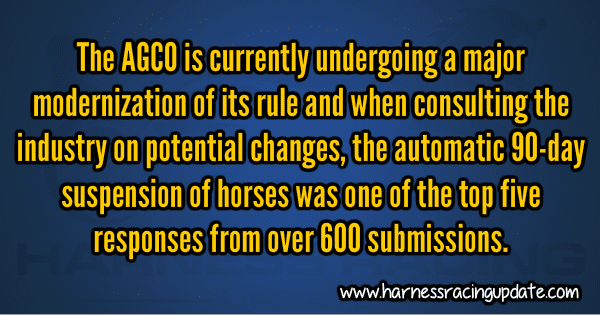Major rule changes in Ontario
AGCO CEO Jean Major talks about changes to drug violations in Ontario, the WEG/Gural integrity rule and the ongoing work to overhaul the province’s racing rules.
by Dave Briggs
Horses with class I, II, III or TCO2 positives may still be suspended from racing in Ontario for 90 days, but that suspension is no longer automatic and will be determined on a case-by-case basis, said the head of the sport’s regulator in the province. It’s all part of a number of rule revisions that will officially go into effect some time in April.
Jean Major, the CEO of the Alcohol and Gaming Commission of Ontario (AGCO) which also oversees the province’s alcohol, casino and gaming industries, said the automatic 90-day suspension has been in Ontario’s rules for 10 years and “was well-intentioned as a general deterrent” but was also time consuming and expensive “and really didn’t move the needle on what was intended through this particular suspension.”
The AGCO is currently undergoing a major modernization of its rule and when consulting the industry on potential changes, the automatic 90-day suspension of horses was one of the top five responses from over 600 submissions.
“I would argue it was nearly unanimous, which is rare in this business, with the desire to have it replaced with something else and that’s the essence of what we did here,” Major said.
That said, Major stressed the number of Class I or II positive tests is minimal. Of all the positive tests — which in and of themselves are minimal compared to the number of horses tested — only 12 per cent were of the most serious Class I, II or TCO2 variety, Major said.
The official recommendation to suspend horses on a case-by-base basis came from the AGCO’s Equine Drug Program Working Group that met five times between May and November of 2017 and focused on “ways to improve the process on how drug issues are managed, and in a way that is aligned with our approach to regulation.
“The three areas they focused on were: the automatic 90-day suspension for the horse, how to modernize the process as to how these (violations) are dealt with — with a specific distinction on the class of drugs — and the last one was on the actual suspensions and monetary penalties in general, as to whether or not they were appropriate or needed to be revised. The bulk of the recommendations focused largely on process-related issues,” Major said.
Major said the group comprised some 20 people from all three racing breeds in Ontario, including participants, racetrack representatives, veterinarians and people working at the Canadian Pari-Mutuel Agency (CPMA).
The working group also suggested offering settlement options in equine drug violation cases to deal with cases faster. The AGCO has decided, in some cases, to offer a “lesser monetary penalty and/or suspension” in exchange for the licensee admitting to the violation and not being able to appeal the ruling.
Major said the settlement process has been adopted on the liquor and casino side of the AGCO’s business and is designed to save money and process cases faster.
“On the liquor side of our business, within a year, we reduced all of the minor-related offences by about 95 per cent. It’s a huge savings,” Major said.
“The objective behind the settlements is to streamline that process. We’re not saying that there will be no repercussions or sanctions for those lesser types of violations, but we don’t spend months and months going through an expensive hearing process, both for the horsepeople as well as for the Commission, but rather go through a process that gets to the issue very quickly and gets a settlement very quickly,” Major said. “We aren’t removing the rights of appeals, but we’re just saying here’s our case, this is what we found, do you have any mitigating circumstances that would then go towards penalty or sanction? That gives an opportunity for the licensee to give their side of the story very quickly, then we offer a settlement. Someone could get a warning to a suspension or to a monetary penalty, but it avoids the lengthy, costly process of a hearing.”
Major said the AGCO would maintain the right to not offer a settlement — most likely for the most serious violations — but the vast majority of cases would qualify for a settlement.
“Eighty-eight per cent of the positives were from therapeutic type of medications, so Class III — not including TC02 — Class IV and V. So 88 per cent are what we consider, most of the time, errors and not expressly with the intent of trying to cheat. So we are dealing with a small minority for the more serious Class I, Class II and TC02 cases, but we spend about as much time dealing with the 88 per cent as we do with the 12 per cent of more serious cases,” Major said.
The AGCO will also adopt a centralized expert evaluation group for drug violations rather than have them reviewed by race officials.
“It is to have the decision-making process, when these positives come forward, centralized through a head office specifically trained on the Equine Drug Program and have access to not only legal, but also veterinary expertise in making their decisions in reviewing the evidence and making decisions quickly… as opposed to having it done at all the racetracks by a whole bunch of different judges or stewards,” Major said.
“With the chemistry arguments or physiology kind of arguments, it’s very technical and you need a panel of experts that can review these and make an informed decision more quickly and more consistently.”
The AGCO will also strive to improve its transparency on drug violations by publishing that information on its website
“This year we’ll be rolling out the pilot we had for the judges’ reports, making them public, and that’s going to go for all of the tracks in 2018 and that would include, of course, the positive test information,” Major said.
He said TCO2 levels for horses would not be published, yet.
“I need to study that a bit more,” Major said. “There may be unintended consequences of doing so and I think we need a bit more time to think that one through.”
The AGCO is also working on a long list of other rule updates, Major said.
“We also have a working group on health and safety and I do want to push the bar here on education, training and awareness, not necessarily as part of the sanctions process, but just generally. Again, it’s just intended to improve compliance across the industry,” Major said.
“We will be doing a clean-up and housekeeping of the rules of racing in time to be aligned with the racing season for this year… The first step is cleaning up your process. The second step is looking at your penalty structure. In this particular case that includes a very comprehensive education, training and awareness strategy. The last step is your compliance enforcement strategy and you focus on the highest risk areas and individuals in the industry.”
Major said the rule upgrade process “is a big project” that will take most of 2018 and, in some cases, part of 2019 to complete.
“I’m very optimistic,” Major said. “I’m very grateful for all the personal sacrifices that people have made for the working groups. They have full-time jobs and they are busy otherwise, but they were committed to it and spent a lot of time giving us advice. When there were disagreements, we worked them out in a very professional manner, so it was a good model for us to follow as we go along. The nature of this regulatory model requires flexibility, because the risks change year over year and we need to have a model that’s flexible to address those risks. The best way to do that is to have an open dialogue with the industry.
AGCO’s take on WEG/Gural rule
Major confirmed the AGCO had some issues with the proposed WEG/Gural integrity rule (full story here) aimed at penalizing horse owners and asked that the rule be put off until 2019.
“There were some issues with respect to… not so much what they are trying to accomplish — because I don’t disagree with them at all with what they are trying to do — it’s a question of how,” Major said. “There are portions of what they are trying to do that conflicted with our rules, so we either had to change the rules or Woodbine had to alter its program. But I didn’t want to lose sight, and neither did Woodbine, on what they were trying to accomplish. So we needed more time to have a discussion about that.
“In the current format that they have I don’t think it would work with the rules we have. There are due process issues that would be difficult to overcome in the current structure of their program, but I remain hopeful in some way of getting to where we both want to end up, which is improving the integrity of the business.
“We are working at a staff level, kicking around some ideas of how we could get there.”

















